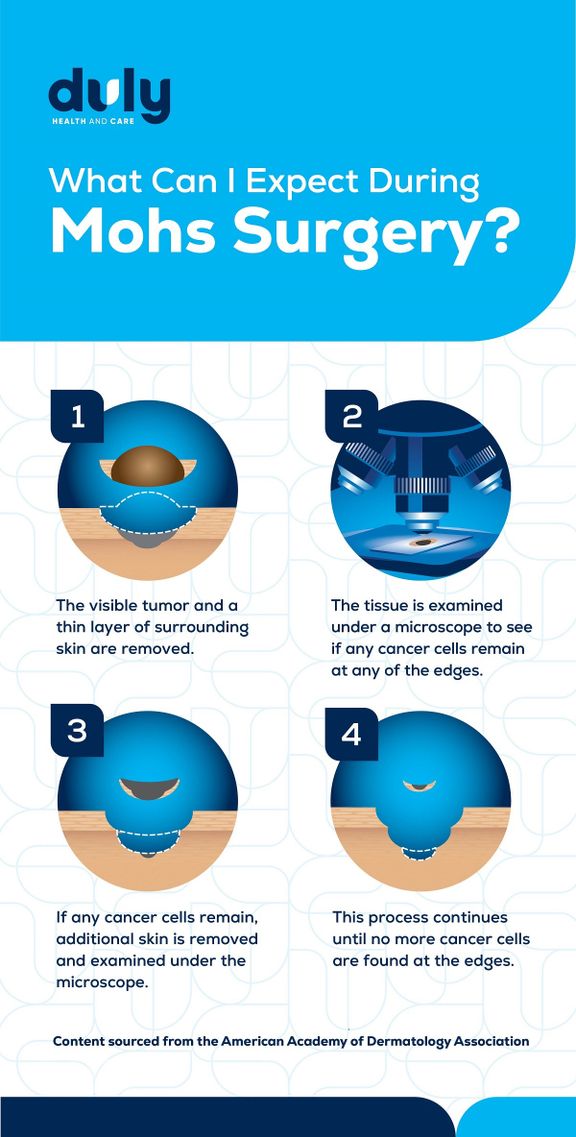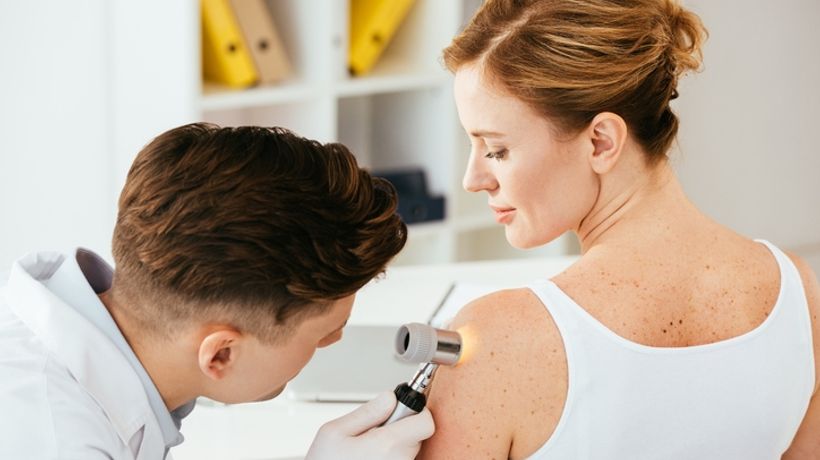Mohs micrographic surgery is a step-wise surgical technique to remove skin cancer. This process was first developed by Dr. Frederic Mohs in the 1930s at the University of Wisconsin-Madison. Mohs surgery offers the highest cure rate for localized skin cancer, up to 99 percent for skin cancers that have not been previously treated. Mohs surgery is primarily used to treat basal cell carcinoma and squamous cell carcinoma and is appropriate for skin cancers located on the scalp, face, neck, hands, feet and genitals where it is important to preserve healthy tissue. Other indications include skin cancers in areas of prior radiation, skin cancers that have been previously treated and have regrown, aggressive skin cancers, skin cancers that are growing rapidly and skin cancers in immunocompromised patients. Your physician will discuss with you if Mohs micrographic surgery is the appropriate treatment for your skin cancer based on skin cancer type, location and size.
How to Prepare for Mohs Surgery
- On the day of your surgery, plan to spend at least 3 – 4 hours in our office. In complex cases, you may be with us for most of the day.
- On the morning of your surgery, please eat a normal breakfast. Food will not interfere with your surgery. If you have an afternoon appointment, please eat lunch.
- Please take all of your medications as prescribed on the day of your surgery. If you take blood thinning medications such as Coumadin®, Plavix®, Eliquis® or Aspirin, please continue taking these medications.
- Please take a shower and wash your hair on the day of surgery.
- Please do not apply makeup, perfume or cologne on the day of your surgery.
- Consider wearing clothing with buttons and bring layers as the surgical suite may be cold.
- On the day of surgery, please arrive 15 minutes prior to your scheduled appointment to complete any necessary paperwork.
- Consider bringing a book, iPad®, family member or friend to help pass time throughout the surgical day.
- Most patients can drive themselves to and from clinic on the day of surgery, however, if the skin cancer is located around the eye, please plan to have a driver with you.
What to Expect During Mohs Surgery
The surgery is performed under local anesthesia at a Duly Health and Care office. You will be asked to confirm the surgical site. The area surrounding the skin cancer will be cleaned and a local anesthetic will be used to numb the surgical site. A thin layer of tissue will be removed around the skin cancer. The removed tissue will be processed in a lab into color-coded, frozen section slides while you wait in a waiting room with a temporary bandage. The removed tissue will be analyzed by your physician, a map will be drawn and any remaining cancer cells will be located. If cancer remains, you will be brought back to the procedure room and the entire process will be repeated until you are cancer free. Once you are cancer free, your physician will discuss your reconstruction options.

Following Mohs surgery, reconstruction options include:
- If your surgical wound is small, it may be left to heal without stitches on its own.
- Many wounds may be closed with stitches in a straight line.
- Some wounds may be larger and require a local skin flap or graft to provide the best functional and cosmetic outcome.
- If a wound is very large, your physician may contact another surgeon to assist with your reconstruction.
- All of your options will be discussed and you will have time to ask questions.
What to Expect After Mohs Surgery
Detailed wound care instructions will be reviewed verbally on the day of the surgery. You will receive the same instructions in writing as well. Depending on the extent of surgery, your limitations may vary and this will be discussed on the day of surgery. Stitches will remain in place between 7 – 21 days, depending on the location and size of the surgery site.
Please be aware that any skin cancers treated on the top of the head, forehead, around the eyes, cheeks, nose or other areas may lead to swelling and potentially bruising around the eyes. This can be extensive and significant. If your surgery is around your lips or your mouth, you may have swelling that takes weeks or longer to resolve.
Please do not schedule surgery around a social obligation (ie, wedding, vacation), work obligation, or any other special event.
Pain management will be reviewed on the day of surgery.
If you have any questions or concerns, please call the clinic or our office and ask to speak with a Mohs Surgery clinical staff member. We look forward to seeing you on your surgery day.




